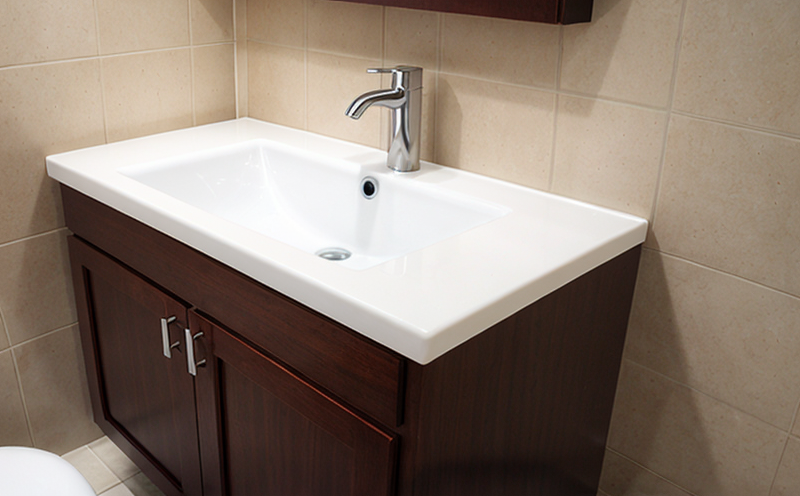UNE EN ISO 16495 Compatibility Testing of Bathroom Plastic Containers
The UNE EN ISO 16495 standard addresses the compatibility testing of materials used in bathroom plastic containers, ensuring that these products do not leach harmful substances into water or other contact media. This critical test is essential for manufacturers and quality managers to comply with regulatory requirements and ensure product safety.
The primary focus of this service involves assessing the potential for chemical migration from plastics into water or other liquids used in bathroom applications, such as soap, shampoo, and cleaning agents. The UNE EN ISO 16495 standard requires that materials remain inert under specified conditions, minimizing the risk of contamination. This is particularly important given the diverse range of chemicals found in modern bathroom products.
The testing process involves placing test specimens under controlled conditions designed to mimic real-world usage scenarios. Specimens are typically subjected to immersion in water or other relevant media at specific temperatures and for defined durations, followed by analysis for leachable substances. Compliance with this standard is crucial not only for product safety but also for brand reputation and market access.
Our laboratory utilizes state-of-the-art equipment and adheres strictly to the UNE EN ISO 16495 protocol to ensure accurate and reliable test results. The testing apparatus includes immersion chambers, temperature-controlled incubators, and analytical instrumentation capable of detecting trace levels of leachable substances. Our team of experts ensures that each specimen is prepared and tested according to best practices.
The acceptance criteria for UNE EN ISO 16495 are stringent, requiring that no significant migration of chemicals from the plastic container into the contact medium occurs. This includes strict limits on the concentration of leachable substances such as heavy metals, phthalates, and other potentially harmful compounds. Compliance with these standards is not only a legal requirement but also essential for maintaining consumer trust.
Our laboratory offers this service to manufacturers, quality managers, R&D engineers, and procurement professionals who need to ensure the safety of their bathroom plastic containers. By providing accurate and reliable test results, we help clients make informed decisions that enhance product safety and regulatory compliance.
Why It Matters
The importance of UNE EN ISO 16495 compatibility testing cannot be overstated. In the bathroom plastics sector, materials come into direct contact with water, soaps, and other chemicals. These substances can potentially leach harmful chemicals into the products or the environment if not tested properly.
Compliance with this standard is essential for several reasons:
- Regulatory Compliance: Adhering to international standards ensures that your products meet global regulatory requirements, facilitating market access and avoiding costly recalls.
- Consumer Trust: Ensuring product safety builds trust with consumers, which is critical for maintaining brand reputation and customer loyalty.
- Product Integrity: The test ensures that materials do not degrade or release harmful substances under typical usage conditions, preserving the integrity of your products.
Environmental and Sustainability Contributions
The UNE EN ISO 16495 standard plays a crucial role in promoting environmental sustainability by ensuring that bathroom plastic containers are safe for both the environment and consumers. By preventing harmful substances from leaching into water or other contact media, this test helps reduce the risk of pollution and health risks associated with contaminated products.
Our laboratory’s commitment to sustainable practices is reflected in our approach to UNE EN ISO 16495 testing. We use energy-efficient equipment and minimize waste by reusing materials where possible. Additionally, we encourage clients to adopt more sustainable materials that meet these stringent standards, thereby contributing to a greener future.
By promoting the use of safe and environmentally friendly plastics in bathroom products, our service helps manufacturers reduce their environmental footprint and contribute positively to global sustainability efforts.
Competitive Advantage and Market Impact
In a highly competitive market, ensuring product safety and compliance with international standards can give your company a significant competitive advantage. Clients who choose our UNE EN ISO 16495 compatibility testing service benefit from:
- Enhanced Brand Reputation: By demonstrating commitment to product safety and environmental responsibility, you can enhance your brand’s reputation among consumers.
- Increased Market Access: Compliance with international standards opens doors to new markets and international trade opportunities.
- Reduced Risk of Product Recalls: Preventing harmful substances from leaching into products reduces the risk of recalls and associated costs.
- Innovation and Development: Our expertise in UNE EN ISO 16495 testing can help you stay ahead of regulatory changes and industry trends, fostering innovation in your product development process.





